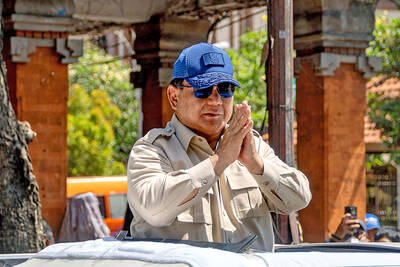UN Secretary-General Ban Ki-moon faced a barrage of criticism on Friday for apparently praising the Burmese junta without winning any concessions over human rights or a move toward democracy.
Ban was under pressure to produce concrete results from his two-day mission to Burma, which was criticized as providing an endorsement to the Burmese leadership just as it is staging a trial of opposition leader Aung San Suu Kyi.
The high-stakes visit to Burma comes at a critical time for Ban, whose low-key approach to his job has been criticized as ineffectual.
He came under further fire on arrival in Naypyidaw, the regime’s headquarters, when he told the head of the junta, General Than Shwe: “I appreciate your commitment to moving your country forward.”
“That is absolute nonsense,” said Brad Adams, a Burma specialist at Human Rights Watch. “It’s just what we implored him not to say, to make these diplomatic gaffes. Than Shwe has steadily moved his country backwards.”
British officials were also furious at the remarks. They had urged Ban not to visit Burma and risk handing the junta a propaganda prize without ensuring he would gain concessions in the form of the release of political prisoners and steps toward genuine democracy.
“Only agreement to release all political prisoners [and] start a genuine dialogue with the opposition and ethnic groups will give any credibility to the elections in 2010,” British Prime Minister Gordon Brown said in an article in the US online magazine the Huffington Post.
According to his office at No. 10 Dowing Street, London, Brown calls Ban at least twice a week to discuss Burma.
“I hope that Ban Ki-moon can convince the generals to take the first steps,” Brown said. “A serious offer is on the table: The international community will work with Burma if the generals are prepared to embark on a genuine transition to democracy. But if the Burmese regime refuses to engage, the international community must be prepared to respond robustly.”
However, Than Shwe said little at his meeting with Ban and did not grant the secretary-general’s request to meet Aung San Suu Kyi in prison. Ban expressed hope that a meeting could still be permitted.

DEADLOCK: Putin has vowed to continue fighting unless Ukraine cedes more land, while talks have been paused with no immediate results expected, the Kremlin said Russia on Friday said that peace talks with Kyiv were on “pause” as Ukrainian President Volodymyr Zelenskiy warned that Russian President Vladimir Putin still wanted to capture the whole of Ukraine. Meanwhile, US President Donald Trump said that he was running out of patience with Putin, and the NATO alliance said it would bolster its eastern front after Russian drones were shot down in Polish airspace this week. The latest blow to faltering diplomacy came as Russia’s army staged major military drills with its key ally Belarus. Despite Trump forcing the warring sides to hold direct talks and hosting Putin in Alaska, there

North Korea has executed people for watching or distributing foreign television shows, including popular South Korean dramas, as part of an intensifying crackdown on personal freedoms, a UN human rights report said on Friday. Surveillance has grown more pervasive since 2014 with the help of new technologies, while punishments have become harsher — including the introduction of the death penalty for offences such as sharing foreign TV dramas, the report said. The curbs make North Korea the most restrictive country in the world, said the 14-page UN report, which was based on interviews with more than 300 witnesses and victims who had

COMFORT WOMEN CLASH: Japan has strongly rejected South Korean court rulings ordering the government to provide reparations to Korean victims of sexual slavery The Japanese government yesterday defended its stance on wartime sexual slavery and described South Korean court rulings ordering Japanese compensation as violations of international law, after UN investigators criticized Tokyo for failing to ensure truth-finding and reparations for the victims. In its own response to UN human rights rapporteurs, South Korea called on Japan to “squarely face up to our painful history” and cited how Tokyo’s refusal to comply with court orders have denied the victims payment. The statements underscored how the two Asian US allies still hold key differences on the issue, even as they pause their on-and-off disputes over historical

CONSOLIDATION: The Indonesian president has used the moment to replace figures from former president Jokowi’s tenure with loyal allies In removing Indonesia’s finance minister and U-turning on protester demands, the leader of Southeast Asia’s biggest economy is scrambling to restore public trust while seizing a chance to install loyalists after deadly riots last month, experts say. Demonstrations that were sparked by low wages, unemployment and anger over lawmakers’ lavish perks grew after footage spread of a paramilitary police vehicle running over a delivery motorcycle driver. The ensuing riots, which rights groups say left at least 10 dead and hundreds detained, were the biggest of Indonesian President Prabowo Subianto’s term, and the ex-general is now calling on the public to restore their